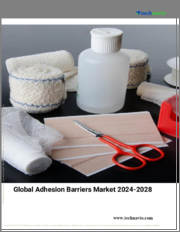
|
시장보고서
상품코드
1792383
유착 방지제 시장 보고서 : 제품별, 제제별, 용도별, 지역별(2025-2033년)Adhesion Barriers Market Report by Product, Formulation, Application, and Region 2025-2033 |
||||||
세계의 유착 방지제 시장 규모는 2024년 11억 1,270만 달러에 달했습니다. IMARC Group은 시장이 2033년까지 19억 320만 달러에 이를 전망이며, 2025-2033년 성장률(CAGR)은 5.84%로 성장할 것으로 예측했습니다. 심장혈관 외과, 재건 외과, 비뇨기과 수술 등에서의 필름 기반 의료용 임플란트의 용도 확대가 시장을 강화하고 있습니다.
유착 방지제 시장 분석 :
- 주요 시장 성장 촉진요인 : 수술 후 치료에 대한 수요 증가는 시장을 활성화시키는 주요 요인 중 하나입니다.
- 주요 시장 동향 : 스포츠 관련 부상의 증례가 증가하는 것이 중요한 성장 유발 요인으로 작용하고 있습니다. 이 외에도 복강경 시스템 사용시 편리하고 효과적인 스프레이식 필름에 대한 요구의 고조도 시장에 공헌하고 있습니다.
- 경쟁 구도 : 세계 시장의 저명한 기업은 Anika Therapeutics, Inc., Atrium Medical Corporation, Baxter International, Inc., Betatech Medical, CR Bard, Inc., FzioMed, Inc., LifeSciences Corporation, Medical Devices Business Services, Inc., MAST Biosurgery Inc., Groupe Sanofi 등이 있습니다.
- 지리적 동향 : 개인의 헬스케어 지출 증가가 북미 시장을 자극하고 있습니다.
- 과제 및 기회 : 효과의 편차는 시장을 방해합니다. 그러나 향후 수년간 확고한 임상 증거가 시장을 활성화할 것으로 예측됩니다.
유착 방지제 시장 동향 :
외과 수술 증가
부인과 질환, 심혈관 질환, 정형외과 질환 등 수술이 필요한 질병의 이환율 증가가 시장을 활성화하고 있습니다. 또한 통증, 합병증, 추가 수술의 원인이 되는 흉터 조직의 형성을 억제할 필요성이 높아지고 있는 것도 성장을 가속하는 중요한 요인이 되고 있습니다. 예를 들어, 2024년 4월, FzioMed, Inc.는 이탈리아 로마에서 개최된 Hysteroscopy, Assisted Reproductive Technology, and Ultrasound(HARTUS) 회의에서 복강경 및 자궁경 수술 후 유착 형성을 최소화하도록 설계된 혁신적인 Oxiplex 유착 방지 겔 제품 포트폴리오. 이것은 유착 방지제 시장 수요를 높이고 있습니다.
기술적 진보 증가
생체 흡수성 재료의 개량과 함께, 생물 제제의 채용이 증가하고 있는 것이 시장을 자극하고 있습니다. 생체 흡수성 재료는 염증 반응의 감소, 조직 적합성 향상, 수술 시의 적용이 용이합니다. 예를 들어, 2024년 2월 하버드 대학의 Wyss Institute for Biologically Inspired Engineering 과학자들은 키토산의 얇은 필름을 사용하여 동일하거나 다른 유형의 하이드로겔과 다른 고분자 재료로 만들어진 층을 효과적으로 접착하는 범용적이고 쉬운 방법을 개발했습니다.
신규 치료 증가
의료비 증가가 시장을 강화하고 있습니다. 또한, 의료 서비스에 대한 접근성 향상에 대한 주목이 높아지고 있는 것도 시장에 밝은 전망을 가져오고 있습니다. 예를 들어, 2024년 5월, Radboud University Medical Center의 3개 프로젝트가 ZonMW와 KCE의 협력을 통해 BeNeFIT 프로그램에서 자금을 받았습니다. 이 세 가지 프로젝트는 모두 벨기에와 네덜란드의 여러 병원에서 실시되는 대규모 임상 연구와 관련이 있습니다. 이 연구는 정신과, 수술, 집중 치료에 중점을 둡니다.
목차
제1장 서문
제2장 조사 범위 및 조사 방법
- 조사의 목적
- 이해관계자
- 데이터 소스
- 1차 정보
- 2차 정보
- 시장 추정
- 상향식 접근
- 하향식 접근
- 조사 방법
제3장 주요 요약
제4장 서문
- 개요
- 주요 업계 동향
제5장 세계의 유착 방지제 시장
- 시장 개요
- 시장 실적
- COVID-19의 영향
- 시장 예측
제6장 시장 내역 : 제품별
- 합성
- 천연
제7장 시장 내역 : 제제별
- 필름
- 액체
- 겔
제8장 시장 내역 : 용도별
- 부인과 수술
- 일반 수술 및 복부 수술
- 심장혈관 수술
- 정형외과 수술
- 신경외과
- 재건 수술
- 비뇨기과 수술
- 기타
제9장 시장 내역 : 지역별
- 북미
- 미국
- 캐나다
- 아시아태평양
- 중국
- 일본
- 인도
- 한국
- 호주
- 인도네시아
- 기타
- 유럽
- 독일
- 프랑스
- 영국
- 이탈리아
- 스페인
- 러시아
- 기타
- 라틴아메리카
- 브라질
- 멕시코
- 기타
- 중동 및 아프리카
- 시장 내역 : 국가별
제10장 SWOT 분석
- 개요
- 강점
- 약점
- 기회
- 위협
제11장 밸류체인 분석
제12장 Porter's Five Forces 분석
- 개요
- 구매자의 협상력
- 공급기업의 협상력
- 경쟁도
- 신규 참가업체의 위협
- 대체품의 위협
제13장 가격 지표
제14장 경쟁 구도
- 시장 구조
- 주요 기업
- 주요 기업 프로파일
- Anika Therapeutics Inc.
- Atrium Medical Corporation
- Baxter International, Inc.
- Betatech Medical
- CR Bard, Inc.
- FzioMed Inc.
- LifeSciences Corporation
- Medical Devices Business Services, Inc.
- MAST Biosurgery Inc.
- Groupe Sanofi
The global adhesion barriers market size reached USD 1,112.7 Million in 2024. Looking forward, IMARC Group expects the market to reach USD 1,903.2 Million by 2033, exhibiting a growth rate (CAGR) of 5.84% during 2025-2033. The increasing applications of these film-based medical implants in cardiovascular, reconstructive, and urological surgeries are bolstering the market.
Adhesion Barriers Market Analysis:
- Major Market Drivers: The rising demand for postoperative procedures is one of the key factors catalyzing the market.
- Key Market Trends: The growing cases of sports-related injuries are acting as significant growth-inducing factors. Besides this, the increasing need for spray-type films that are more convenient and effective to use during laparoscopic systems is also contributing to the market.
- Competitive Landscape: Some of the prominent companies in the global market include Anika Therapeutics, Inc., Atrium Medical Corporation, Baxter International, Inc., Betatech Medical, C. R. Bard, Inc., FzioMed, Inc., LifeSciences Corporation, Medical Devices Business Services, Inc., MAST Biosurgery Inc., and Groupe Sanofi, among many others.
- Geographical Trends: The inflating healthcare expenditures of individuals are stimulating the market in North America.
- Challenges and Opportunities: The variability in efficacy is hampering the market. However, robust clinical evidence is expected to fuel the market in the coming years.
Adhesion Barriers Market Trends:
Growing Surgical Procedures
The increasing incidence of conditions requiring surgery, such as gynecological, cardiovascular, and orthopedic disorders, is catalyzing the market. Moreover, the inflating need for reducing the formation of scar tissue that can lead to pain, complications, and additional surgeries is also acting as another significant growth-inducing factor. For example, in April 2024, FzioMed, Inc. showcased its innovative Oxiplex adhesion barrier gel product portfolio designed to minimize the formation of post-surgical adhesions following laparoscopic and hysteroscopic surgery at Hysteroscopy, Assisted Reproductive Technology, and Ultrasound (HARTUS) congress in Rome, Italy. This is escalating the adhesion barriers market demand.
Increasing Technological Advancements
The rising adoption of biologics, along with the improvements in bioresorbable materials, are stimulating the market. They offer reduced inflammatory responses, better tissue compatibility, and easier application during surgical procedures. For instance, in February 2024, scientists at the Wyss Institute for Biologically Inspired Engineering at Harvard created a versatile and simple method to effectively bond layers made of the same or different types of hydrogels and other polymeric materials using a thin film of chitosan, which is expanding adhesion barriers market share.
Rising Novel Medical Treatment
The inflating healthcare expenditure capacities are strengthening the market. Apart from this, the increasing focus on providing better access to healthcare services is further providing a positive outlook to the market. For example, in May 2024, three projects from Radboud University Medical Center received funding from the BeNeFIT program, a collaboration between ZonMW and KCE. All three projects involve major clinical studies conducted in several hospitals across Belgium and the Netherlands. These studies focus on psychiatry, surgery, and intensive care.
Global Adhesion Barriers Industry Segmentation:
Breakup by Product:
- Synthetic
- Natural
Synthetic dominates the market
Synthetic adhesion barriers represent engineered materials that prevent post-surgical adhesions. One such example is REPEL-CV, a bioresorbable adhesion barrier designed for utilization in cardiovascular surgeries, which is increasing the adhesion barriers market outlook.
Breakup by Formulation:
- Film
- Liquid
- Gel
The film holds the majority of the global adhesion barriers market revenue
Film adhesion barriers are aimed at improving efficacy and patient outcomes. A significant launch is the GYNECARE INTERCEED absorbable adhesion barrier.
Breakup by Application:
- Gynecological Surgeries
- General/Abdominal Surgeries
- Cardiovascular Surgeries
- Orthopedic Surgeries
- Neurological Surgeries
- Reconstructive Surgeries
- Urological Surgeries
- Others
Gynecological surgeries dominate the adhesion barriers market statistics
The rising focus on preventing the formation of adhesions that can lead to complications is driving the segment's growth. PREVADH(R) absorbable adhesion barrier introduced by FzioMed is gaining extensive traction, as it is easy to handle.
Breakup by Region:
- North America
- United States
- Canada
- Asia Pacific
- China
- Japan
- India
- South Korea
- Australia
- Indonesia
- Others
- Europe
- Germany
- France
- United Kingdom
- Italy
- Spain
- Russia
- Others
- Latin America
- Brazil
- Mexico
- Others
- Middle East and Africa
North America exhibits a clear dominance in the market
The market research report has also provided a comprehensive analysis of all the major regional markets, which include North America (the United States and Canada); Asia Pacific (China, Japan, India, South Korea, Australia, Indonesia, and others); Europe (Germany, France, the United Kingdom, Italy, Spain, Russia, and others); Latin America (Brazil, Mexico, and others); and the Middle East and Africa. According to the report, North America accounted for the largest market share.
As per the adhesion barriers market overview, the widespread surgical procedures are acting as significant growth-inducing factors. For example, the REPEL-CV adhesion barrier by SyntheMed is specifically designed for cardiovascular surgeries.
Competitive Landscape:
The market research report has provided a comprehensive analysis of the competitive landscape. Detailed profiles of all major adhesion barriers market companies have also been provided. Some of the key players in the market include:
- Anika Therapeutics, Inc.
- Atrium Medical Corporation
- Baxter International, Inc.
- Betatech Medical
- C. R. Bard, Inc.
- FzioMed, Inc.
- LifeSciences Corporation
- Medical Devices Business Services, Inc.
- MAST Biosurgery Inc.
- Groupe Sanofi
Key Questions Answered in This Report
- 1.What was the size of the global adhesion barriers market in 2024?
- 2.What is the expected growth rate of the global adhesion barriers market during 2025-2033?
- 3.What are the key factors driving the global adhesion barriers market?
- 4.What has been the impact of COVID-19 on the global adhesion barriers market?
- 5.What is the breakup of the global adhesion barriers market based on the product?
- 6.What is the breakup of the global adhesion barriers market based on the formulation?
- 7.What is the breakup of the global adhesion barriers market based on application?
- 8.What are the key regions in the global adhesion barriers market?
- 9.Who are the key players/companies in the global adhesion barriers market?
Table of Contents
1 Preface
2 Scope and Methodology
- 2.1 Objectives of the Study
- 2.2 Stakeholders
- 2.3 Data Sources
- 2.3.1 Primary Sources
- 2.3.2 Secondary Sources
- 2.4 Market Estimation
- 2.4.1 Bottom-Up Approach
- 2.4.2 Top-Down Approach
- 2.5 Forecasting Methodology
3 Executive Summary
4 Introduction
- 4.1 Overview
- 4.2 Key Industry Trends
5 Global Adhesion Barriers Market
- 5.1 Market Overview
- 5.2 Market Performance
- 5.3 Impact of COVID-19
- 5.4 Market Forecast
6 Market Breakup by Product
- 6.1 Synthetic
- 6.1.1 Market Trends
- 6.1.2 Market Forecast
- 6.2 Natural
- 6.2.1 Market Trends
- 6.2.2 Market Forecast
7 Market Breakup by Formulation
- 7.1 Film
- 7.1.1 Market Trends
- 7.1.2 Market Forecast
- 7.2 Liquid
- 7.2.1 Market Trends
- 7.2.2 Market Forecast
- 7.3 Gel
- 7.3.1 Market Trends
- 7.3.2 Market Forecast
8 Market Breakup by Application
- 8.1 Gynecological Surgeries
- 8.1.1 Market Trends
- 8.1.2 Market Forecast
- 8.2 General/Abdominal Surgeries
- 8.2.1 Market Trends
- 8.2.2 Market Forecast
- 8.3 Cardiovascular Surgeries
- 8.3.1 Market Trends
- 8.3.2 Market Forecast
- 8.4 Orthopedic Surgeries
- 8.4.1 Market Trends
- 8.4.2 Market Forecast
- 8.5 Neurological Surgeries
- 8.5.1 Market Trends
- 8.5.2 Market Forecast
- 8.6 Reconstructive Surgeries
- 8.6.1 Market Trends
- 8.6.2 Market Forecast
- 8.7 Urological Surgeries
- 8.7.1 Market Trends
- 8.7.2 Market Forecast
- 8.8 Others
- 8.8.1 Market Trends
- 8.8.2 Market Forecast
9 Market Breakup by Region
- 9.1 North America
- 9.1.1 United States
- 9.1.1.1 Market Trends
- 9.1.1.2 Market Forecast
- 9.1.2 Canada
- 9.1.2.1 Market Trends
- 9.1.2.2 Market Forecast
- 9.1.1 United States
- 9.2 Asia Pacific
- 9.2.1 China
- 9.2.1.1 Market Trends
- 9.2.1.2 Market Forecast
- 9.2.2 Japan
- 9.2.2.1 Market Trends
- 9.2.2.2 Market Forecast
- 9.2.3 India
- 9.2.3.1 Market Trends
- 9.2.3.2 Market Forecast
- 9.2.4 South Korea
- 9.2.4.1 Market Trends
- 9.2.4.2 Market Forecast
- 9.2.5 Australia
- 9.2.5.1 Market Trends
- 9.2.5.2 Market Forecast
- 9.2.6 Indonesia
- 9.2.6.1 Market Trends
- 9.2.6.2 Market Forecast
- 9.2.7 Others
- 9.2.7.1 Market Trends
- 9.2.7.2 Market Forecast
- 9.2.1 China
- 9.3 Europe
- 9.3.1 Germany
- 9.3.1.1 Market Trends
- 9.3.1.2 Market Forecast
- 9.3.2 France
- 9.3.2.1 Market Trends
- 9.3.2.2 Market Forecast
- 9.3.3 United Kingdom
- 9.3.3.1 Market Trends
- 9.3.3.2 Market Forecast
- 9.3.4 Italy
- 9.3.4.1 Market Trends
- 9.3.4.2 Market Forecast
- 9.3.5 Spain
- 9.3.5.1 Market Trends
- 9.3.5.2 Market Forecast
- 9.3.6 Russia
- 9.3.6.1 Market Trends
- 9.3.6.2 Market Forecast
- 9.3.7 Others
- 9.3.7.1 Market Trends
- 9.3.7.2 Market Forecast
- 9.3.1 Germany
- 9.4 Latin America
- 9.4.1 Brazil
- 9.4.1.1 Market Trends
- 9.4.1.2 Market Forecast
- 9.4.2 Mexico
- 9.4.2.1 Market Trends
- 9.4.2.2 Market Forecast
- 9.4.3 Others
- 9.4.3.1 Market Trends
- 9.4.3.2 Market Forecast
- 9.4.1 Brazil
- 9.5 Middle East and Africa
- 9.5.1 Market Trends
- 9.5.2 Market Breakup by Country
- 9.5.3 Market Forecast
10 SWOT Analysis
- 10.1 Overview
- 10.2 Strengths
- 10.3 Weaknesses
- 10.4 Opportunities
- 10.5 Threats
11 Value Chain Analysis
12 Porters Five Forces Analysis
- 12.1 Overview
- 12.2 Bargaining Power of Buyers
- 12.3 Bargaining Power of Suppliers
- 12.4 Degree of Competition
- 12.5 Threat of New Entrants
- 12.6 Threat of Substitutes
13 Price Indicators
14 Competitive Landscape
- 14.1 Market Structure
- 14.2 Key Players
- 14.3 Profiles of Key Players
- 14.3.1 Anika Therapeutics Inc.
- 14.3.1.1 Company Overview
- 14.3.1.2 Product Portfolio
- 14.3.1.3 Financials
- 14.3.1.4 SWOT Analysis
- 14.3.2 Atrium Medical Corporation
- 14.3.2.1 Company Overview
- 14.3.2.2 Product Portfolio
- 14.3.3 Baxter International, Inc.
- 14.3.3.1 Company Overview
- 14.3.3.2 Product Portfolio
- 14.3.3.3 Financials
- 14.3.3.4 SWOT Analysis
- 14.3.4 Betatech Medical
- 14.3.4.1 Company Overview
- 14.3.4.2 Product Portfolio
- 14.3.5 C. R. Bard, Inc.
- 14.3.5.1 Company Overview
- 14.3.5.2 Product Portfolio
- 14.3.6 FzioMed Inc.
- 14.3.6.1 Company Overview
- 14.3.6.2 Product Portfolio
- 14.3.7 LifeSciences Corporation
- 14.3.7.1 Company Overview
- 14.3.7.2 Product Portfolio
- 14.3.7.3 Financials
- 14.3.7.4 SWOT Analysis
- 14.3.8 Medical Devices Business Services, Inc.
- 14.3.8.1 Company Overview
- 14.3.8.2 Product Portfolio
- 14.3.8.3 Financials
- 14.3.8.4 SWOT Analysis
- 14.3.9 MAST Biosurgery Inc.
- 14.3.9.1 Company Overview
- 14.3.9.2 Product Portfolio
- 14.3.10 Groupe Sanofi
- 14.3.10.1 Company Overview
- 14.3.10.2 Product Portfolio
- 14.3.1 Anika Therapeutics Inc.



















